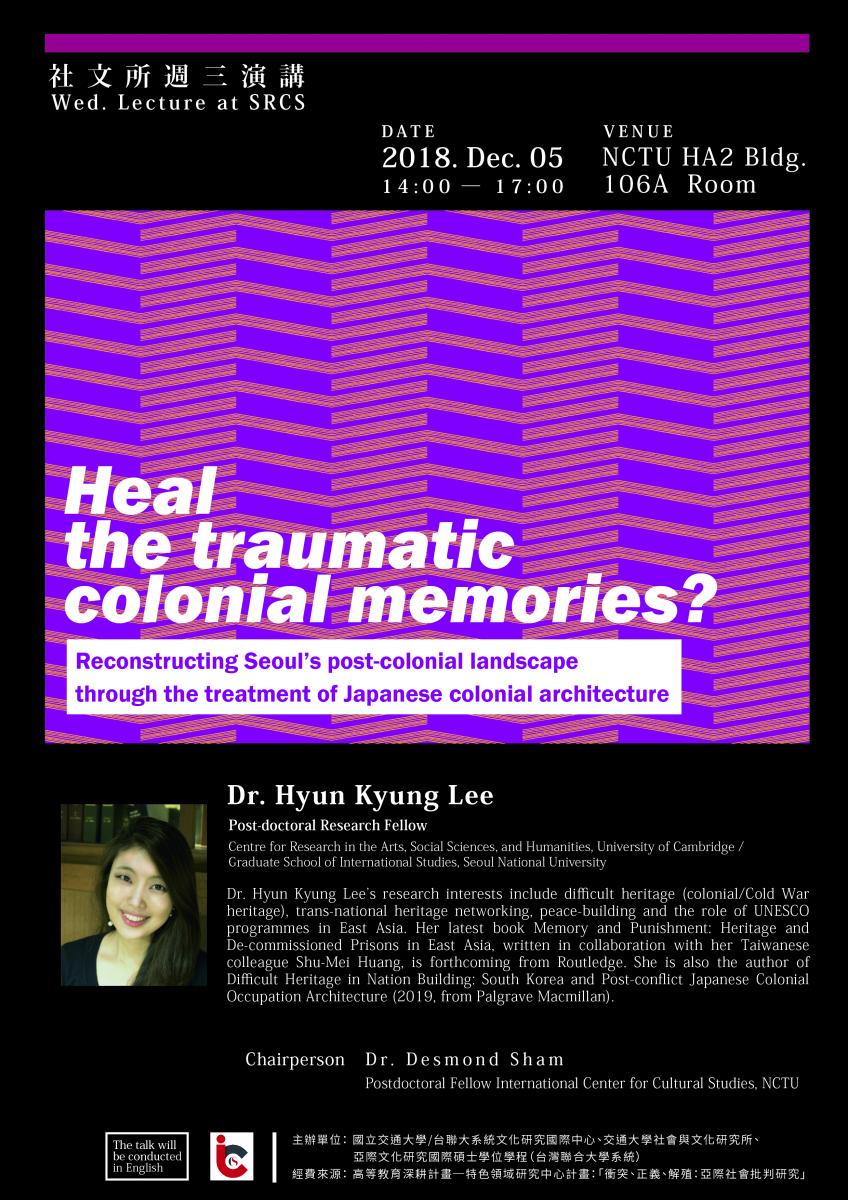


2018-12-05
記憶政治與治理技藝:亞際社會的國家、民族與歷史系列
演講:治癒創傷的殖民記憶?首爾後殖民地景與日本殖民建築的處理
*講座將以英語進行
日期:2018/12/5 (三) 14:00 - 17:00
地點 :交通大學人社二館 106A教室
講者:李炫炅 (劍橋大學人文社科研究中心/首爾大學國際大學院 博士後研究員)
主持:岑學敏 (國立交通大學文化研究國際中心 博士後研究員)
講座摘要:
The Japanese authorities constructed their empire in Korea (1910–45) along lines that echoed and repurposed the traditions of Joseon (as Korea was formerly known). They attempted to signify their power through physical construction projects associated with their empire-building project, in particular in Seoul, the colonial Korean capital. As Japan deliberately targeted Korean traditional buildings, either replacing them with modern Japanese architecture or destroying them, Seoul became the centre of a conflict between Korean tradition and Japanese modernisation. Hence, Japan’s invasion of Korea was a critical turning point in Seoul’s physical and symbolic transformation, and Japanese colonial memories were inscribed in the city’s landscape.
This paper seeks to understand how South Korea has reconstructed Seoul’s post-colonial landscape through its treatment of the Japanese architectural legacy after liberation. In particular, this paper focuses on four case studies of locations which are regarded as the critical points of Seoul’s landscape: 1) the Grand Shrine of Joseon (South, religious), 2) the Japanese Government-General Building (North, political), 3) Seodaemun Prison (West, political), and 4) Dongdaemun Stadium (East, cultural). This study investigates how they have been differently managed and how their visual representation and symbolic meanings have been changed. In addition, it examines which factors affect the diverse outcomes experienced by each, and accounts for how these different management approaches related to with the handling of South Korea’s traumatic colonial memories, and whether these treatments either heal or twist the national trauma.
講者介紹 :
李炫炅現為劍橋大學人文社科研究中心與首爾大學國際大學院的博士後研究員,正執行由韓國學中央研究院資助的「超越冷戰,邁向亞洲社群」的研究計劃。她的研究興趣包括困難襲產(殖民、冷戰襲產)、跨國襲產網絡、東亞的建設和平與聯合國計劃的角色。最新著作包括:Memory and Punishment: Heritage and De-commissioned Prisons in East Asia(與黃舒楣合著,Routledge,快將出版)、Difficult Heritage in Nation Building: South Korea and Post-conflict Japanese Colonial Occupation Architecture(Palgrave Macmillan, 2019)
經費來源: 高等教育深耕計畫─特色領域研究中心計畫:「衝突、正義、解殖:亞際社會批判研究」
主辦單位: 國立交通大學/台聯大系統文化研究國際中心、交通大學社會與文化研究所、亞際文化研究國際碩士學位學程(台灣聯合大學系統)
近期活動 Recent Activities